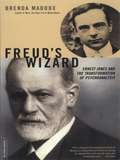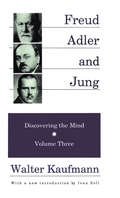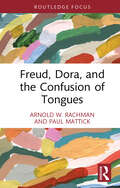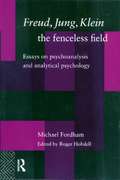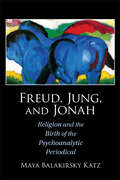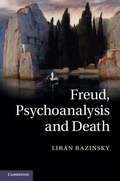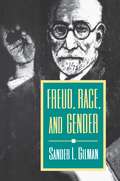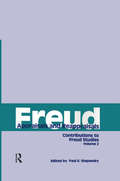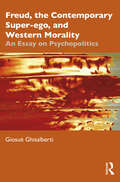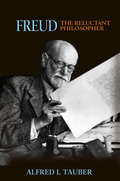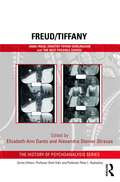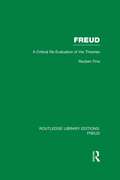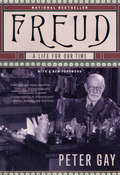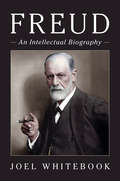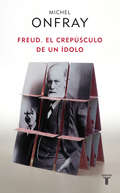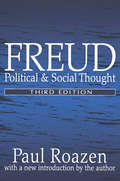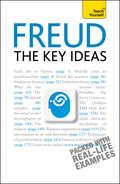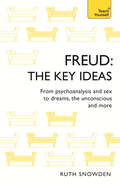- Table View
- List View
Freud's Wizard: Ernest Jones and the Transformation of Psychoanalysis
by Brenda MaddoxThe saturation of the English-speaking world with psychoanalytic concepts was due largely to one brilliant analyst, Ernest Jones. As Freud’s disciple, colleague, and biographer-and the man who rescued Freud from the Nazis-he led the international psychoanalytic movement, shifting its vortex from Vienna to London and spreading its influence to Toronto, New York, and Boston. While negotiating the ferocious politics of the movement, Jones also managed an imposing series of liaisons, including an heiress and her maid, analysands, and a "Druid Bride. ” Unlike Freud, he never had to wonder, "What do women want?”
Freud, Alder, and Jung: Discovering the Mind
by Walter KaufmannWalter Kaufmann completed this, the third and final volume of his landmark trilogy, shortly before his death in 1980. The trilogy is the crowning achievement of a lifetime of study, writing, and teaching. This final volume contains Kaufmann's tribute to Sigmund Freud, the man he thought had done as much as anyone to discover and illuminate the human mind. Kaufmann's own analytical brilliance seems a fitting reflection of Freud's, and his acute commentary affords fitting company to Freud's own thought.Kaufmann traces the intellectual tradition that culminated in Freud's blending of analytic scientific thinking with humanistic insight to create "a poetic science of the mind." He argues that despite Freud's great achievement and celebrity, his work and person have often been misunderstood and unfairly maligned, the victim of poor translations and hostile critics. Kaufmann dispels some of the myths that have surrounded Freud and damaged his reputation. He takes pains to show how undogmatic, how open to discussion, and how modest Freud actually was.Kaufmann endeavors to defend Freud against the attacks of his two most prominent apostate disciples, Alfred Adler and Carl Gustav Jung. Adler is revealed as having been jealous, hostile, and an ingrate, a muddled thinker and unskilled writer, and remarkably lacking in self-understanding. Jung emerges in Kaufmann's depiction as an unattractive, petty, and envious human being, an anti-Semite, an obscure and obscurantist thinker, and, like Adler, lacking insight into himself. Freud, on the contrary, is argued to have displayed great nobility and great insight into himself and his wayward disciples in the course of their famous fallings-out.
Freud, Dora, and the Confusion of Tongues (Psychoanalytic Inquiry Book Series)
by Arnold W. Rachman Paul MattickResponding to growing interest in issues of gender and power as they arise within psychoanalysis, Freud, Dora, and the Confusion of Tongues re-examines Freud’s iconic case of Dora from the perspective of Sandor Ferenczi’s investigation of the sexual manipulation of children by adults. Freud believed that his analysis of Dora demonstrated the truth of his Oedipal theory; his treatment was based on interpretations of her statements as evidence of an unresolved Oedipal conflict. In contrast, Ferenczi’s Confusion of Tongues theory focused on the actual interactions between young people and adults who made use of their social status and power to substitute sexuality for the affection children desire. Where Freud located the origin of neurosis in psychological processes interior to the analysand, Ferenczi directed attention to the real traumatic aspects of the relationships between people. By such critical investigation, this book most strikingly shows that Freud’s imposition of his interpretations on Dora, despite his sincere wish to be of help to her, represented an abusive retraumatization. Arguing that it is essential to understand linguistic and other representational systems of experience, and the interrelation between the reproduction and transformation of self, in a contemporary analysis of Dora’s case, this book will appeal to psychoanalysts, philosophers and all those interested in a new understanding of classical psychoanalysis.
Freud, Jung, Klein - The Fenceless Field: Essays on Psychoanalysis and Analytical Psychology
by Michael FordhamA friend of Jung and Winnicott, Michael Fordham was co-editor of the collected works of Jung and the first editor of the Journal of Anaylytical Psychology. Freud, Jung, Klein - The Fenceless Field draws together his key writings on the relationship between psychoanalysis and analytical psychology.
Freud, Jung, and Jonah: Religion and the Birth of the Psychoanalytic Periodical
by Maya Balakirsky KatzReligion, more than sexuality, cast psychoanalysis in controversy and onto the world stage even as it threatened to dismantle the psychoanalytic collective. In the founding years of the first psychoanalytic periodicals, relational dynamics shaped the psychoanalytic corpus on religion. The psychoanalytic pioneers developed their ideas in tandem even if in protest to one another. Religion is a topic worthy of engagement, not least because the symbolized terrain in the history of religion was so often deployed as a vehicle for motivating, disciplining, or editing out a member of the psychoanalytic community in publication. This book offers an interdisciplinary approach to religion and psychology, including a compelling denouement that reveals new narratives about longstanding rumours in the early history of the psychoanalytic movement. Above all, this volume demonstrates that the first generation of psychoanalysts succeeded in writing themselves into the history of religious thought and sacralizing the origins of psychoanalysis.
Freud, Psychoanalysis and Death
by Liran RazinskyWas 'death' a lacuna at the heart of Sigmund Freud's work? Liran Razinsky argues that the question of death is repressed, rejected and avoided by Freud, therefore resulting in an impairment of the entire theoretical structure of psychoanalysis. Razinsky supports his claim through a series of close readings of psychoanalytic texts (including not just Freud, but Klein, Kohut, Jung and Lacan among others) that explore psychoanalysis' inattention to this fundamental human concern. The readings are combined to form an overall critique of psychoanalysis - one that remains sympathetic but calls for a rethinking of the issue of death. In presenting a fresh and persuasive interpretation of the Freudian corpus, this book will be of interest to scholars of Freud's thought and psychoanalysis, literary scholars, analysts, clinicians and to all those curious about death's psychic life.
Freud, Race, and Gender
by Sander L. GilmanA Jew in a violently anti-Semitic world, Sigmund Freud was forced to cope with racism even in the "serious" medical literature of the fin de siècle, which described Jews as inherently pathological and sexually degenerate. In this provocative book, Sander L. Gilman argues that Freud's internalizing of these images of racial difference shaped the questions of psychoanalysis. Examining a variety of scientific writings, Gilman discusses the prevailing belief that male Jews were "feminized," as stated outright by Jung and others, and concludes that Freud dealt with his anxiety about himself as a Jew by projecting it onto other cultural "inferiors"--such as women. Gilman's fresh view of the origins of psychoanalysis challenges those who separate Freud's revolutionary theories from his Jewish identity.
Freud, V. 2: Appraisals and Reappraisals
by Paul E. StepanskyVolume 2 of the Freud: Appraisals and Reappraisals series bears out the promise of the acclaimed premier volume, a volume whose essays "breathe new life into the study of Freud," embodying research that "appears to be impeccable in every case" (International Review of Psychoanalysis). It begins with Peter Homan's detailed reeexamination of the period 1906-1914 in Freud's life. Looking to Freud's relationahips with Jung as the central event of the period, he finds in Freud's idealization and subsequent de-idealization of Jung a psychological motif that gains recurrent expression in Freud's later writings and personal relationships. Richard Geha offers a provocative protrait of Freud as a "fictionalist." Anchoring his exegesis in Freud's famous case of the Wolf Man, he argues that the yield of Freud's clinical inquiries, epistemologically, is a species of the fictionalism of Friedrich Nietzsche and Hans Vaihinger. But, pursuing the argument, Geha goes on to advance little-noted biographical evidence that Freud understood himself to be an artist whose clinical productions were ultimately artistic. Finally, Patricia Herzog organizes and interprets Freud's seemingly conflicting remarks about philosophy and philosophers en route to the claim that the long-held belief that Freud was an "anti-philosopher" is a myth. In fact, she claims, "Freud was in no doubt as to the philosophical nature of his goal." In an introductory essay titled "Pathways to Freud's Identity," editor Paul E. Stepansky brings together the essays of Homans, Geha, and Herzog as complementary inquiries into Freud's putative self-understanding and, to that extent, as reconstructive, historical continuations of the self-analysis methodically begun by Freud in the late 1890s. "Each contributor," writes Stepansky, "in his or her own way, seeks to understand Freud better in the spirit in which Freud might have better understood himself. Together, the contributors offer vistas to an enlarged self-analytic sensibility."
Freud, V.1: Appraisals and Reappraisals
by Paul E. StepanskyA response to the veritable renaissance in Freud studies, Freud: Appraisals and Reappraisals presents the readers with the fruits of recent scholarship on Freud, the man and scientist, and the origins and development of the psychoanalytic movement spawned by his work. The premier volume of this series offers three major essays embodying different tributaries of contemporary Freud research. Peter Swales, drawing on extensive archival research, reveals the identity and explores the life and times of the woman Freud terms his first "teacher," but presented to his readers only as the "Frau Caecilie M" of the Studies on Hysteria. Barry Silverstein brings together complementary strands of textual analysis and psychobiographical reconstruction in his provocative reconsideration of the circumstances surrounding Freud's lost papers on metapsychology. Finally, Edwin Wallace's integrative review of Freud's scattered remarks on ethics and morality, combined with his appraisal of Freud's personal ethics, yield a measured and scholarly account of Freud as "ethicist." Briefer essays on Freud and the oral tradition (Patrick Mahony), Freud's psychology of religion (Paul Stepansky), and recent assessments of Freud's character (John Gedo) round out a volume that is destined for a place of distinction in the secondary literature on Freud. Collectively, these essays represent a most auspicious debut for the new series; they admirably bear out Paul Stepansky's intent of "presenting readers with original articles that embody high scholarship an a thought-provoking and imaginative use of the fruits of this scholarship."
Freud, the Contemporary Super-ego, and Western Morality: An Essay on Psychopolitics
by Giosuè GhisalbertiFreud, the Contemporary Super-ego, and Western Morality traces the origins of the relationship between the morality of the super-ego and the destructive impulse of the death drive in the liberal democracies of the 21st century. Giosuè Ghisalberti begins by refuting the analysis by contemporary social theorists of the phenomenon described as "the return of the religious," presenting instead a comprehensive set of ideas as outlined by Freud in the writings of the 1920s and the analysis of a contemporary theological-political unconscious. Ghisalberti argues that the psyche of the liberal West has regressed to an infantile and primitive present, driven by an unconscious hostility towards the Oedipus complex and, more comprehensively, to Western civilization as a whole. The book re-examines Freud’s psychoanalytic ideas on the nature of obsessions, interpreted first from the murder of the primal father in Totem and Taboo, and turns to his grounding ideals of intelligence, creativity, and freedom as the affirmation of the coming-to-be-human in modernity. Freud, the Contemporary Super-ego, and Western Morality will be of great interest to psychoanalysts in practice and in training. It will also be key reading for academics and scholars of psychoanalytic studies, philosophy, political theory and the humanities.
Freud, the Reluctant Philosopher
by Alfred I. TauberFreud began university intending to study both medicine and philosophy. But he was ambivalent about philosophy, regarding it as metaphysical, too limited to the conscious mind, and ignorant of empirical knowledge. Yet his private correspondence and his writings on culture and history reveal that he never forsook his original philosophical ambitions. Indeed, while Freud remained firmly committed to positivist ideals, his thought was permeated with other aspects of German philosophy. Placed in dialogue with his intellectual contemporaries, Freud appears as a reluctant philosopher who failed to recognize his own metaphysical commitments, thereby crippling the defense of his theory and misrepresenting his true achievement. Recasting Freud as an inspired humanist and reconceiving psychoanalysis as a form of moral inquiry, Alfred Tauber argues that Freudianism still offers a rich approach to self-inquiry, one that reaffirms the enduring task of philosophy and many of the abiding ethical values of Western civilization.
Freud/Tiffany: Anna Freud, Dorothy Tiffany Burlingham and the ‘Best Possible School’
by Elizabeth Ann Danto Alexandra Steiner-StraussWith over 100 archival photographs and nine original, wide-ranging essays, Freud/Tiffany brings to life the fascinating intersection of psychoanalysis and education. Out of the cultural and political ferment of inter-war Vienna emerged the Hietzing School, founded in the 1920s by Anna Freud, the youngest daughter of Sigmund Freud, and Dorothy Tiffany Burlingham, the youngest daughter of the great American artist Louis Comfort Tiffany. Anna Freud’s story unfolds over three decades from her adolescence through the 1940s, as she and Dorothy Tiffany Burlingham leverage their hands-on research with children into educational innovations at the Hietzing School and beyond. The Viennese psychoanalysts of the 1920s demonstrated a unique sensitivity to marginalised populations and to the impact of war, its threats and its aftermath, especially on the lives of children. The book features never-before-seen historical photographs, including four of Sigmund Freud, as well as unpublished archival material and original paintings. Drawings, manuscripts and memoirs make vivid the founders’ vision of the Hietzing School’s origins, its day-to-day experience and its enduring significance for our understanding of education and the developing mind. Marking the first publication of many of the historic materials originally showcased in 2017 at a major Freud Museum London exhibition, the international scholarship behind Freud/Tiffany demonstrates that the Hietzing School remains the seedbed for a surprising range of modern theory and practice in child and adolescent mental health, from Erik Erikson’s lifespan model of 'identity' to the legal concept of 'the best interests of the child'. The Freud and Tiffany legacies are now brought together as never before in this lively book, and the Hietzing School is restored to its rightful place in the history of so many ideas with which we are still working today. The book is essential for any reader interested in the cultural legacy of interwar Vienna.
Freud: A Critical Re-evaluation of his Theories (Routledge Library Editions: Freud)
by Reuben FineIn this book, originally published in 1963, Dr Fine sets out to describe what Freud said, and to re-evaluate his views critically in the light of the best knowledge of the time. Freud’s numerous changes of view, his constant searching for the truth wherever it might lead him, as well as his resolute adherence to certain hard-won positions once he had achieved them, are all skilfully traced. Freud’s intellectual Odyssey is divided into four periods. From 1886 to 1895 he was a neurologist investigating hysteria and other ‘nervous’ disorders. Then came his self-analysis, from 1896 to 1899, the real matrix from which psycho-analysis grew. The first psycho-analytic system of psychology was developed in the period from 1900 to 1914. The remainder of his life, from 1914 to 1939, was devoted to the elaboration of ego psychology, and heart of contemporary psycho-analysis. Dr Fine undertook, in writing this book, the formidable task of examining the whole body of Freud’s thought, to clarify what he said, and to review his ideas critically in the light of the best available existing knowledge. As he says ‘In this process of criticism I have tried to specify which aspects of Freud have stood the test of time and which have not.’ ‘So far as I can see no one has ever before taken the trouble to ask: "What did Freud actually say? How does what Freud said stand up in terms of what we now know?"’ In answering these questions, Dr Fine develops a major thesis that all modern psycho-analysis derives from Freud, though it has moved far in many different directions. The contention is that emphasis on schools is misleading and has obscured the actual historical growth of the science. As he states in his Preface to this volume, Dr Fine’s conviction is: ‘By building on Freud’s fundamental insights, we can move on most readily to empirical research and thus construct a more satisfactory science of psychology.’
Freud: A Life For Our Time
by Peter GayNorton celebrates the 150th anniversary of Freud's birth by reissuing Peter Gay's best-selling biography, featuring a new introduction.
Freud: A Very Short Introduction
by Anthony StorrSigmund Freud, the founder of psychoanalysis, developed a totally new way of looking at human nature. Only now, with the hindsight of the half-century since his death, can we assess his true legacy to current thought. As an experienced psychiatrist himself, Anthony Storr offers a lucid and objective look at Freud's major theories, evaluating whether they have stood the test of time, and in the process examines Freud himself in light of his own ideas. An excellent introduction to Freud's work, this book will appeal to all those broadly curious about psychoanalysis, psychology, and sociology.
Freud: An Intellectual Biography (Berkeley Forum In The Humanities Ser.)
by Joel WhitebookThe life and work of Sigmund Freud continue to fascinate general and professional readers alike. Joel Whitebook here presents the first major biography of Freud since the last century, taking into account recent developments in psychoanalytic theory and practice, gender studies, philosophy, cultural theory, and more. Offering a radically new portrait of the creator of psychoanalysis, this book explores the man in all his complexity alongside an interpretation of his theories that cuts through the stereotypes that surround him. The development of Freud's thinking is addressed not only in the context of his personal life, but also in that of society and culture at large, while the impact of his thinking on subsequent issues of psychoanalysis, philosophy, and social theory is fully examined. Whitebook demonstrates that declarations of Freud's obsolescence are premature, and, with his clear and engaging style, brings this vivid figure to life in compelling and readable fashion.
Freud: Bullet Guide
by Robert AndersonOpen this book and you will Grasp psychoanalysis Master Freudian theories Explore key concepts Understand his influence
Freud: Bullet Guide
by Robert AndersonOpen this book and you will Grasp psychoanalysis Master Freudian theories Explore key concepts Understand his influence
Freud: Dictionary of Psychoanalysis
by Nandor Fodor Frank GaynorThis book comprises Freud's dictionary on Psychoanalysis and would be a useful tool for all interested in Psychology.
Freud: El crepúsculo de un ídolo
by Michel OnfrayEl prestigioso filósofo francés Michel Onfray, autor del best seller Tratado de ateología, ha escrito un ataque virulento contra el psicoanálisis, y en particular contra el freudismo, vehementemente argumentado y que ha creado una gran polémica en Francia. Onfray parte en este libro de una idea simple pero radical: Freud quiso construir una «ciencia» y no lo consiguió; quiso «probar» que el inconsciente tenía sus leyes, su lógica intrínseca, sus protocolos de experimentación, y usó todos los medios a su alcance para adornar el psicoanálisis con la apariencia de lo científico. Con gran rigor, Michel Onfray reexamina las obras de Freud, así como su biografía, para desvelar sus inconsistencias y contradicciones y ofrecer una conclusión implacable: el psicoanálisis no es más que el producto de influencias de la psicología, de la literatura y de la filosofía, pero en ningún caso es la ciencia a la que aspiraba su fundador. La crítica ha dicho...«Un ensayo potente, inteligente e inquietante, escrito de manera simple y directa, hábilmente argumentado y organizado en torno a una tesis sistemáticamente desarrollada.»Robert Maggiori, Libération «Un libro tan contundente como Tratado de ateología.»Livres Hebdo «No solo importante sino también apasionante. Este libro ya es un clásico. Como dice Onfray, ya era hora de sacar a Freud de la leyenda para introducirlo en la historia, donde será discutido, atacado y, por supuesto, defendido.»Le Point «Dejando atrás el freudismo de postal, Onfray se entrega a la deconstrucción de un sistema.»L'Express «Un gran incendio mediático.»Paris Match
Freud: Political and Social Thought (Psychoanalysis)
by Paul RoazenSigmund Freud had broad ambitions about what psychoanalysis could add to human thought. But Freutfs own writings have rarely been assessed within the perspective of political philosophy. Political theorists will find in the school Freud established a rich storehouse of ideas. For us to link up with what Freud was saying means to join in the great conversation about what the ends of the just society should be, as well as what a fully developed person might be like. Written more than twenty years ago, the central interpretive theses found in Freud: Political and Social Thought still ring true.In his new introduction to this classic text, Paul Roazen contends that today, from the point of view of intellectual history, Freud looms as a subject in an even larger way than he did back in the 1960s. His thinking has impinged, for good or ill, on how we think about character and the nature of human impulses. Privacy itself has been affected, so much so that political candidates now feel free to use intimate material from private life for manipulative public purposes. Yet after all this time political scientists remain reluctant to entertain the need to explore the psychological dimension of all political events.Without reducing politics to psychoanalysis, or inflating psychological categories to embrace all of politics, Roazen provides an introductory look at the field of psychoanalysis. By bringing together the different disciplines of psychology and politics he breaks through parochialism. Roazen is no advocate for psychoanalysis, but believes that analysts have as much to learn from social science as the other way around. This volume is proof that at its best political theory has to be inherently interdisciplinary. As such, this volume will be of interest to intellectual historians, psychoanalysts, and political theorists.
Freud: Psychoanalysis, dreams, the unconscious and more
by Ruth SnowdenReading the complete works of Sigmund Freud would take more time than most of us have to spare. Freud - the Key Ideas condenses all the information you need about the life and work of the great man into one book. With clear explanations and examples drawn from Freud's own cases you will soon have a solid understanding of the main concepts, from psychosexual development to dream analysis.NOT GOT MUCH TIME?One, five and ten-minute introductions to key principles to get you started.AUTHOR INSIGHTSLots of instant help with common problems and quick tips for success, based on the author's many years of experience.TEST YOURSELFTests in the book and online to keep track of your progress.EXTEND YOUR KNOWLEDGEExtra online articles at www.teachyourself.com to give you a richer understanding of Freud.FIVE THINGS TO REMEMBERQuick refreshers to help you remember the key facts.TRY THISInnovative exercises illustrate what you've learnt and how to use it.
Freud: Psychoanalysis, dreams, the unconscious and more (TY Philosophy)
by Ruth SnowdenReading the complete works of Sigmund Freud would take more time than most of us have to spare. Freud - the Key Ideas condenses all the information you need about the life and work of the great man into one book. With clear explanations and examples drawn from Freud's own cases you will soon have a solid understanding of the main concepts, from psychosexual development to dream analysis.NOT GOT MUCH TIME?One, five and ten-minute introductions to key principles to get you started.AUTHOR INSIGHTSLots of instant help with common problems and quick tips for success, based on the author's many years of experience.TEST YOURSELFTests in the book and online to keep track of your progress.EXTEND YOUR KNOWLEDGEExtra online articles at www.teachyourself.com to give you a richer understanding of Freud.FIVE THINGS TO REMEMBERQuick refreshers to help you remember the key facts.TRY THISInnovative exercises illustrate what you've learnt and how to use it.
Freud: Psychoanalysis, dreams, the unconscious and more (TY Philosophy)
by Ruth SnowdenReading the complete works of Sigmund Freud would take more time than most of us have to spare. Freud - the Key Ideas condenses all the information you need about the life and work of the great man into one book. With clear explanations and examples drawn from Freud's own cases you will soon have a solid understanding of the main concepts, from psychosexual development to dream analysis.AUTHOR INSIGHTSLots of instant help with common problems and quick tips for success, based on the author's many years of experience.TEST YOURSELFTests in the book and online to keep track of your progress.EXTEND YOUR KNOWLEDGEExtra online articles at www.teachyourself.com to give you a richer understanding of Freud.FIVE THINGS TO REMEMBERQuick refreshers to help you remember the key facts.TRY THISInnovative exercises illustrate what you've learnt and how to use it.
Freud: Psychoanalysis, dreams, the unconscious and more (Teach Yourself Philosophy Ser.)
by Ruth SnowdenReading the complete works of Sigmund Freud would take more time than most of us have to spare. Freud - the Key Ideas condenses all the information you need about the life and work of the great man into one book. With clear explanations and examples drawn from Freud's own cases you will soon have a solid understanding of the main concepts, from psychosexual development to dream analysis.AUTHOR INSIGHTSLots of instant help with common problems and quick tips for success, based on the author's many years of experience.TEST YOURSELFTests in the book and online to keep track of your progress.EXTEND YOUR KNOWLEDGEExtra online articles at www.teachyourself.com to give you a richer understanding of Freud.FIVE THINGS TO REMEMBERQuick refreshers to help you remember the key facts.TRY THISInnovative exercises illustrate what you've learnt and how to use it.
